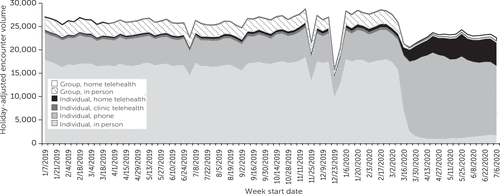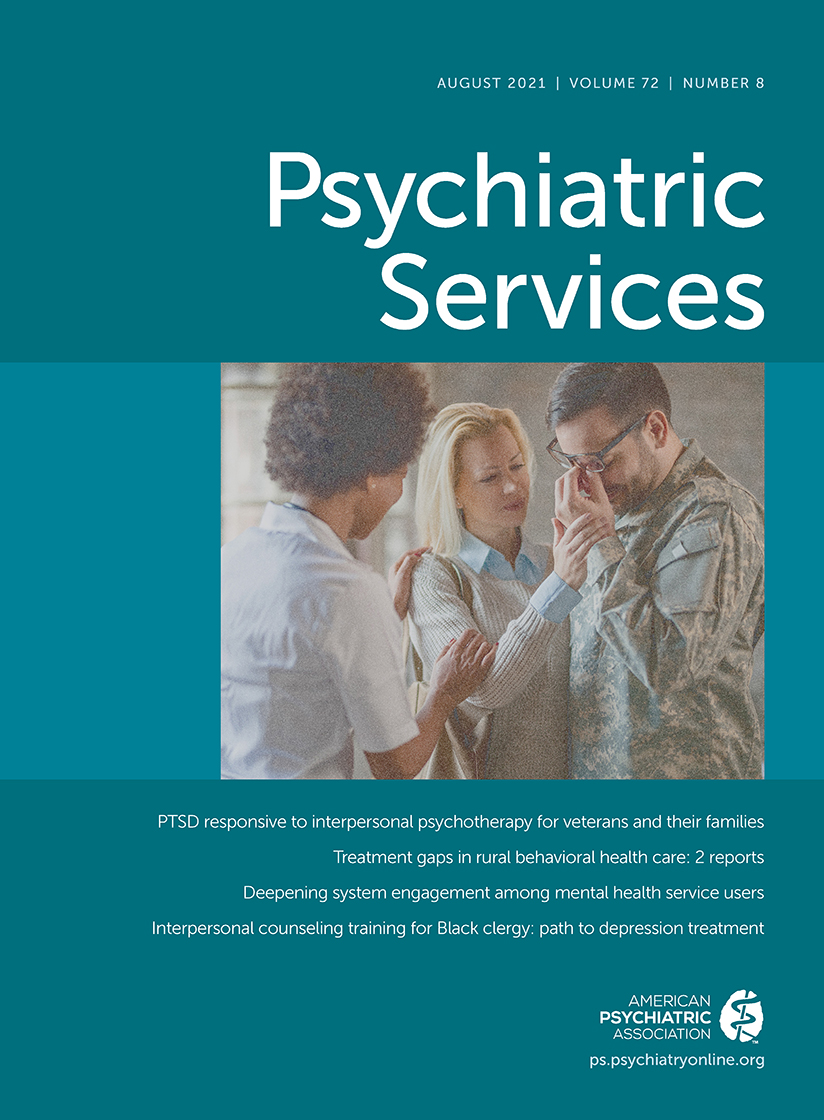Impact of the COVID-19 Pandemic on Primary Care–Mental Health Integration Services in the VA Health System
President Trump declared the COVID-19 pandemic a national emergency on March 13, 2020 (1). Effects of the pandemic on mental health access are important to evaluate. Primary Care–Mental Health Integration (PCMHI) services of the Veterans Health Administration (VHA) focus on the mental health needs of veterans in primary care (PC) settings (2). PCMHI services include colocated mental health and PC practitioners sharing responsibility for patient evaluation and treatment, delivered in person or via video telehealth, and longitudinal care management, often by phone. PCMHI services have offered in-person, same-day availability for patients and in-person collaboration with PC providers. We compared PCMHI utilization before and after the COVID-19 emergency declaration.
Weekly trends in PCMHI encounters were examined as individual and group encounters delivered in person, by phone, and by clinic telehealth (with patient onsite) or home telehealth. Telehealth involves real-time, face-to-face video conferencing. We also compared trends by VHA sites’ remote PCMHI services availability as of December 31, 2019 (3). Comparing the weeks beginning March 2, 2020 (predeclaration), and July 6, 2020 (postdeclaration), in-person individual encounters decreased by 90%, while phone and home telehealth individual encounters increased 147% and 645%, respectively (Figure 1). In-person group encounters decreased 90%, and group home telehealth encounters, averaging two per week predeclaration, increased to >500 per week in the following 9 weeks. Utilization rebounded by 15% in the 5 weeks after March 23, 2020 (the week with the fewest PCMHI encounters), and thereafter remained at approximately 82% of predeclaration volume. Sites that reported remote services availability as of December 31, 2019 (3) had 10.7% increases in encounters from March 23, 2020, to July 12, 2020, while sites reporting only in-person services had continued declines (−9.8%).

FIGURE 1. Primary Care–Mental Health Integration (PCMHI) encounter volume by week and encounter type, January 7, 2019–July 12, 2020a
a In person represents face-to-face encounters at a Veterans Health Administration (VHA) facility; phone encompasses nonvideo telephone encounters; clinic telehealth consists of real-time, face-to-face video conferencing with patient at the same or different VHA facility as PCMHI provider; and home telehealth is delivered as real-time, face-to-face video conferencing with patient at home or other non-VHA location. Because of a small encounter volume, group phone and group clinic telehealth encounters are not shown. A color version is available as an online supplement to this column.
Findings suggest that the pandemic drastically altered patients’ health-seeking behavior and mental health access, seemingly because of reduced acceptability of in-person care, and they document challenges related to remote care availability, particularly at sites without preexisting remote capacities. Further work is needed to understand utilization behavior and preferences regarding care modalities.
1
2 : Treatment initiation following positive depression screens in primary care: a propensity score–weighted analysis of integrated mental health services . J Gen Intern Med (Epub Jun 3, 2020). doi: 10.1007/s11606-020-05694-5 Google Scholar
3 Szymanski BR, Lasky EC, McCarthy JF: National VHA Primary Care–Mental Health Integration Evaluation: Findings from the 2019 PACT PCMHI Program Assessment. Presented at PCMHI Program Office Monthly Education Conference Call Series, 2020 Google Scholar



